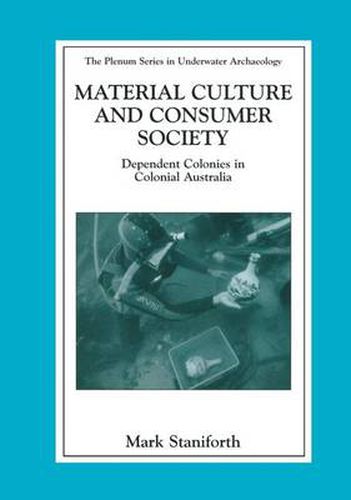Readings Newsletter
Become a Readings Member to make your shopping experience even easier.
Sign in or sign up for free!
You’re not far away from qualifying for FREE standard shipping within Australia
You’ve qualified for FREE standard shipping within Australia
The cart is loading…






This title is printed to order. This book may have been self-published. If so, we cannot guarantee the quality of the content. In the main most books will have gone through the editing process however some may not. We therefore suggest that you be aware of this before ordering this book. If in doubt check either the author or publisher’s details as we are unable to accept any returns unless they are faulty. Please contact us if you have any questions.
Throughout history, material goods have been valued for more than their usefulness; they have also been symbols of status and wealth. During the colonial period of Australia, material goods took on an even more important role for the new arrivals to the island. This text argues that material goods were a necessary adjunct to the successful colonization of Australia demonstrating that it was necessary to establish trade networks that provided adequate supplies of culturally appropriate food, drink and other consumer goods for the newly arrived colonists. Material goods were used: to distinguish the colonists from Indigenous groups; to reassure the colonists about their place in the world; and to help establish the colonists’ own networks of social relations. This text contends that the role of consumption and the part played by material goods were more important to the negotiation of social position in the colonies than in the homeland. This work should be of interest to underwater, historical and cultural archaeologists, social historians, cultural heritage managers, and graduate students of these fields.
$9.00 standard shipping within Australia
FREE standard shipping within Australia for orders over $100.00
Express & International shipping calculated at checkout
This title is printed to order. This book may have been self-published. If so, we cannot guarantee the quality of the content. In the main most books will have gone through the editing process however some may not. We therefore suggest that you be aware of this before ordering this book. If in doubt check either the author or publisher’s details as we are unable to accept any returns unless they are faulty. Please contact us if you have any questions.
Throughout history, material goods have been valued for more than their usefulness; they have also been symbols of status and wealth. During the colonial period of Australia, material goods took on an even more important role for the new arrivals to the island. This text argues that material goods were a necessary adjunct to the successful colonization of Australia demonstrating that it was necessary to establish trade networks that provided adequate supplies of culturally appropriate food, drink and other consumer goods for the newly arrived colonists. Material goods were used: to distinguish the colonists from Indigenous groups; to reassure the colonists about their place in the world; and to help establish the colonists’ own networks of social relations. This text contends that the role of consumption and the part played by material goods were more important to the negotiation of social position in the colonies than in the homeland. This work should be of interest to underwater, historical and cultural archaeologists, social historians, cultural heritage managers, and graduate students of these fields.